Millions of Americans will soon head to their local swimming pool, but a new survey finds that many swimmers aren’t aware they might be wading into potential health risks at the pool.
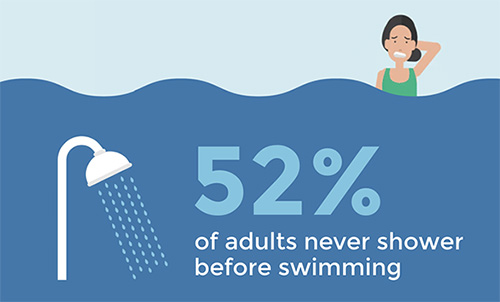
The annual Healthy Pools survey, conducted by the Water Quality & Health Council, found that 63 percent of adults have never checked health inspection reports before swimming in a public pool, with another 15 percent checking those reports only sparingly. In response, the Water Quality & Health Council, the U.S. Centers for Disease Control and Prevention (CDC), and the National Swimming Pool Foundation® (NSPF®) are teaming up to get the word out about healthy and safe swimming before Memorial Day weekend.
These survey findings are especially concerning in light of a 2016 CDC report that found nearly 8 in 10 routine inspections of public pools turned up at least one violation of health and safety rules, and 1 in 8 found problems so serious the pool had to be closed immediately.
“Swimmers and parents of young swimmers can take a few simple but effective steps to help protect themselves and their families from germs and maximize fun at the pool,” said Michele Hlavsa, RN, MPH, epidemiologist and chief of the CDC’s Healthy Swimming Program. “Stay out or keep your kids out of the water if sick with diarrhea, check the pool’s latest inspection score, and do your own mini-inspection before getting in the water.”
In the national survey, swimmers admitted to some unhealthy swimming habits, including:
â— Most adults (52 percent) never shower before swimming. Only 29 percent shower for at least one minute, the length of time needed to remove most contaminants from a swimmer’s body.
â— One in four swimmers (27 percent) admits that they have peed in the pool as an adult.
â— 17 percent of adults would swim within one hour of having diarrhea. This is especially concerning because Cryptosporidium (or Crypto), a microscopic parasite, is the most common cause of diarrheal illness linked to pools.
“Swimming is a rite of summertime, but swimmers’ unhealthy swimming habits can make loved ones sick,” said Dr. Chris Wiant, chair of the Water Quality & Health Council. “We all share the water we swim in. And although chlorine and other pool chemical disinfectants are effective at disinfecting pools, they might be used up by contaminants, such as pee, sweat, and dirt from swimmers’ bodies. Chlorine mixing with these contaminants is what makes swimmers’ eyes red, not chlorine in and of itself. Protect yourself and loved ones by showering before going in the pool and don’t pee in the water.”
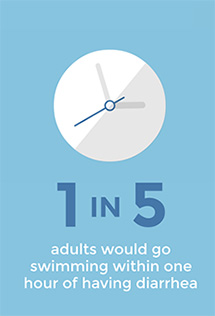 |
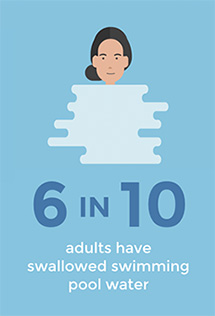 |
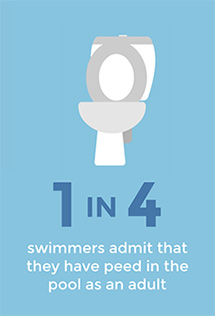 |
Swimmers might be able to check pool inspections online or on-site at the pool facility. Public (non-residential) pools are typically inspected by the health department; backyard pools are not. “Before you go to or get in the water, ask if they have Certified Pool/Spa Operators on staff,” suggests Thomas Lachocki, Ph.D., CEO of NSPF®.
The Water Quality & Health Council has compiled a list of local and state health departments that provide online access to swimming pool inspection reports. If you do not see your local community or state listed, contact your local or state health department, or ask the pool’s manager directly for more information.
Well-maintained pools are less likely to spread germs. Swimmers can keep healthy before getting in the water by checking the pool’s latest inspection results and by making sure the drain at the bottom of the deep end is visible. Also, use pool test strips to confirm the water’s chlorine or bromine level and pH are correct. The CDC recommends pH of 7.2 – 7.8, with free chlorine concentration of at least 1 ppm in pools and at least 3 ppm in hot tubs/spas, and free bromine concentration of at least 3 ppm in pools and at least 4 ppm in hot tubs/spas.
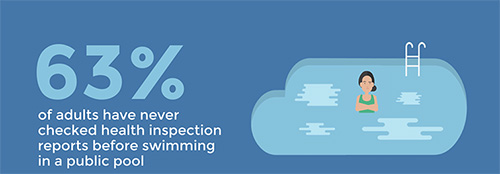
The Water Quality & Health Council is offering free pool test kits through its award-winning Healthy Pools awareness initiative. Swimmers can use the kit to measure chlorine levels and pH in backyard or public pools. They can also drop them in their luggage to check hotel, motel, and theme park pools while on vacation.
The 2018 Healthy Pools survey, conducted online by Sachs Media Group, measured perceptions and behaviors related to swimming pools and public health. Sachs Media Group interviewed 3,000 American adults, April 19 to May 1, 2018. The survey has a margin of error of +/- 2.0 percent.
Press Release









